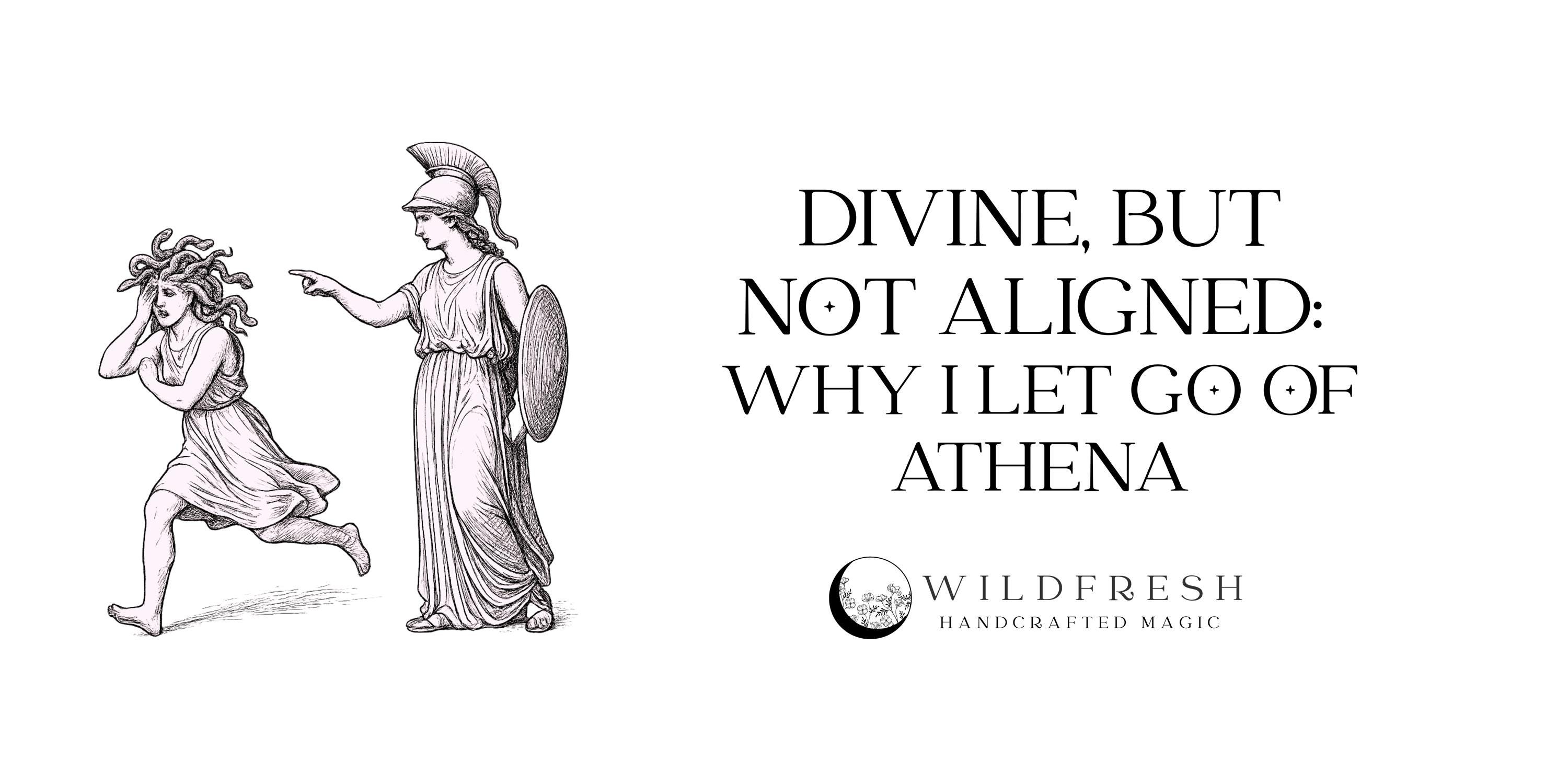🧿 Divine, but Not Aligned: Why I Let Go of Athena
I used to create products inspired by Athena—until I realized I was honoring a goddess who wouldn’t have honored me. At first, she seemed like the perfect archetype to work with: wise, composed, and respected. She was a symbol of feminine intellect, sovereignty, and strategic power. But the deeper I went into her mythology, the more discomfort I felt. Something wasn’t aligning with my values, my practice, or the kind of healing work I want to create through Wildfresh. I wasn’t a devotee, but I did create in her name. And now I believe it’s important to speak to why I no longer do.
The Mythology That Changed Everything
Athena is a goddess of war, wisdom, and strategy. But she was born not from nature or bloodline, not from the divine feminine—but from Zeus's forehead, fully armored and adult. She had no mother, no initiation through pain, no gestation in the dark.Her power was clean, cerebral, and unchallenging to the patriarchy. She never cried. Never grieved. Never birthed. She ruled with the mind, not the heart. That isn’t inherently wrong—but it's not the kind of power I want animating my ritual work.As I looked more closely, I started to see a pattern. Athena did not protect women. More often, she punished them. Her stories are not filled with compassion or community. They are filled with consequences for the ones who dared to be too visible, too honest, too human.
Medusa
Medusa was a beautiful mortal priestess in Athena’s temple. When Poseidon stalked and assaulted her in that sacred space, Athena’s response wasn’t protection or retribution—it was punishment. Athena turned Medusa into a Gorgon, cursing her with serpents for hair and a gaze that turned people to stone. The myth frames it as punishment for “defiling” the temple—as if Medusa had agency in the assault. Later, Athena assisted Perseus in locating and beheading Medusa by giving him a shield and guidance. This was the turning point for me. I asked myself: why would I honor a goddess who turned a survivor into a monster and then armed her killer?
Arachne
Arachne was a skilled mortal weaver who claimed her artistry rivaled the gods. Athena, enraged by the challenge, disguised herself and entered a weaving contest with Arachne. The girl didn’t just match Athena—she exceeded her. Her tapestry depicted scenes of the gods’ many abuses and betrayals, including those of Zeus and Poseidon. Rather than being humbled or intrigued, Athena tore Arachne’s work to shreds and transformed her into a spider, condemning her to weave forever in shame. To me, that’s not divine justice. That’s ego. That’s suppression of truth, artistry, and feminine power.
Pallas
In a lesser-known story, Pallas was Athena’s close friend and sparring partner. During a mock battle, Athena accidentally killed her. Stricken with grief—or perhaps guilt—she took Pallas’s name as part of her own: Pallas Athena. But even here, it feels like the absorption of identity rather than the honoring of it. There’s little in the myth that speaks to remembrance, mourning, or ritualized grief. Just another example of Athena moving forward without making space for feeling.
Why I Let Her Go
Athena represents wisdom, yes—but it’s empire wisdom. Strategy. Head over heart. She’s the girlboss of Mount Olympus. Respected by men because she plays their game better than they do. But me? I don’t want to be wise like that. I want to be wise like the earth. Like the crone. Like the ones who know grief and healing and fire and rebirth. So I stopped. Stopped working with her. Stopped crafting in her name. Stopped pretending her stories sat easy in my soul. Instead, I now work with goddesses and archetypes that honor complexity, softness, and sacred rage.
Who I Create With Now
As far as the Greek and Roman pantheons go, over time, I’ve found myself drawn toward archetypes who hold the dark, the wild, and the sensual alongside the wise.
- Artemis, who walks alone and protects the sacred wild.
- Hekate, who governs the liminal spaces, the thresholds, and the deep mysteries.
- Aphrodite, who reminds us that pleasure is sacred and love is a spell of its own.
These goddesses make space for emotion, for healing, for becoming. They invite honesty.
Final Reflections
Have you ever felt your relationship with an archetype change? Have you worked with a spirit, deity, or energy only to later realize it doesn’t reflect the truth of who you are?You are allowed to evolve. You are allowed to put something down, even if it once felt sacred. You are allowed to stop creating in honor of something that no longer honors you.I f Athena still speaks to you, that’s okay. This isn’t about discrediting her or shaming those who find power in her archetype. But for me, it became clear: her version of strength is not mine.I want to craft in alignment with energies that honor the full spectrum of womanhood. The grief. The rage. The rebirth. The rooted. Athena doesn’t live there. And that’s why I let her go.

